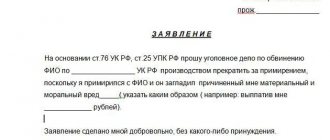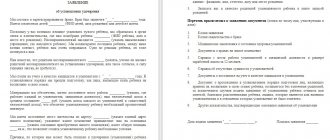It happens that you are stopped on the street and asked to show documents. How to behave in this case? Is the police officer's demand legal? Or another situation: you are called to the police station for questioning. Do I need to show up? And what happens if you ignore the subpoena?
All these situations can affect absolutely every person, even those who have never broken the law. Therefore, it is important to know your rights and not allow law enforcement officers to exceed the powers given to them. Are there rules that govern communication between a citizen and a police officer? What should an ordinary person do in such situations? And how to behave correctly? FAN asked these questions Yulia Sugrobova .
Lawyer Yulia Sugrobova /
A policeman approached me and “asked for documents.” What to do?
Don’t argue and show your passport (which, by the way, is best to always carry with you).
In accordance with clause 2, part 1, art. 13 of the Federal Law “On Police”, police can check your identity documents if there is data that gives reason to suspect you of committing a crime or believe that you are wanted. Probably, right now the policeman has a reason to initiate a case of an administrative offense, so present documents upon request. By the way, a driver's license is not suitable - a passport is required.
If you do not have documents, a police officer may take you to the office premises of a territorial agency or police unit to establish your identity. At the same time, delivery to the police and detention are different procedures. There must be special grounds for detention and it cannot last more than 48 hours.
Nine rules for safe communication with the police
To minimize the risks when dealing with police officers, it is important to know what you are entitled to.
- Find out the details of the police officer who contacted you . Check out his identification, and if it was not presented, remember the number on the badge.
- Do not carry your passport with you . But it’s better to have a photocopy of it with you or at least a photo on your phone, so that you don’t have to spend a long and tedious time proving to the police who you are.
- Call relatives - spouse, parents or friends. If you are detained and taken to the police station, no one has the right to prevent you from calling. Tell your loved ones about your whereabouts.
- Call a lawyer . Having a lawyer’s phone number at hand in your mobile phone contacts list is a very useful practice that can help out in a difficult situation. By the way, you can’t prevent this call either.
- Record a conversation with police officers and traffic police . This can be done on a mobile phone, camera or voice recorder. It is important to understand that only those who have badges are allowed to film. If they are not there, your actions may be considered illegal. Just like recording video at sensitive facilities or when security forces carry out special measures, for example, an “interception” plan. Video and audio recording in this case is prohibited by law.
- Do not testify against yourself and do not testify against close relatives. This requirement is defined by the Constitution of Russia.
- Be understood. Or not to be understood. According to the law, if you do not want to act as a witness, you may well refuse this offer, since this is your right, not an obligation.
- Do not communicate with police officers by phone . And especially not to testify. You can always doubt the identity of the interlocutor and suspect that a scammer is calling you.
- Participate in the preparation of the protocol . And when it is ready, familiarize yourself with it and make your own additions.
If you have received a summons, there is no need to avoid visiting the department. Appearing when summoned is a citizen’s duty, not his right.
Can I film law enforcement officers?
You can also try!
As a general rule, filming law enforcement officers in public places and while performing their official duties is not prohibited. However, this right is not absolute and is limited to the extent that it contradicts the requirements of the criminal procedure law, legislation on administrative offenses and other norms. For example, if video recording may contribute to the disclosure of secrets protected by law - secrets of the investigation, secrets of private life, and so on. But if a police officer prohibits filming, he is obliged to provide the exact reason for the prohibition with reference to a specific norm.
If a police officer asks to “come with him,” can I disobey?
Unfortunately no.
In this case, it is impossible to disobey a police officer - this entails the application of administrative measures under Art. 19.3 of the Code of the Russian Federation on Administrative Offenses (disobedience to a lawful order of a police officer) and can even result in a fine or arrest. It’s better not to take risks, because you are not to blame for anything (at least we hope so).
What is the period of administrative detention?
The period of administrative detention should not exceed 3 hours. But in certain cases, the period of administrative detention can be more than 3 hours, namely 48 hours, this follows from the provisions of Art. 27.5 Code of Administrative Offenses of the Russian Federation. At the same time, Art. 22 of the Constitution of the Russian Federation states that a person cannot be detained for more than 48 hours.
In what cases can a person be detained for a period of 48 hours?
- 1) A person in respect of whom proceedings are being conducted on a case of an administrative offense encroaching on the established regime of the State Border of the Russian Federation and the procedure for staying on the territory of the Russian Federation, on an administrative offense committed in internal sea waters, in the territorial sea, on the continental shelf, in exclusive economic zone of the Russian Federation, or a violation of customs rules, if necessary to establish an identity or to clarify the circumstances of an administrative offense, may be subject to administrative detention for a period of no more than 48 hours.
- 2) A person in respect of whom proceedings are being conducted for an administrative offense, entailing, as one of the measures of administrative punishment, administrative arrest or administrative deportation from the Russian Federation, may be subjected to administrative detention for a period of no more than 48 hours.
Can they confiscate the phone? What about your passport?
Yes, but not always!
Police officers have the right to seize personal belongings only if an arrest has been made. In this case, the seizure of the detainee’s belongings is carried out through a personal search if there is reason to believe that an administrative offense or crime has been committed.
But with a passport everything is a little more complicated. In accordance with clause 22 of the Regulations on the passport of a citizen of the Russian Federation (approved by Decree of the Government of the Russian Federation of July 8, 1997 No. 828), the seizure of a citizen’s passport is prohibited, except in cases provided for by the legislation of the Russian Federation. For example, if your passport turned out to be fake or you were placed in a psychiatric hospital.
Yes, of course, a citizen has every right to record the actions of police officers on camera.
- According to Art. 8 of the Federal Law “On Police” the principle of transparency and openness applies, which means that police activities are open to society.
- In accordance with Art. 29 of the Constitution of the Russian Federation, everyone has the right to freely seek, receive, transmit, produce and disseminate information in any legal way.
- According to Art. 152.1 of the Civil Code of the Russian Federation does not require consent for filming when the use of the image is carried out in state, public or other public interests.
- The Federal Law “On Combating Corruption” dated December 25, 2008 N 273-FZ tells us about the possibility of filming. So, according to Art. 3 Anti-corruption in the Russian Federation is based on the principle of publicity and openness of the activities of state bodies and local governments.
- In accordance with Art. 4 Federal Law “On ensuring access to information about the activities of state bodies and local self-government bodies” The main principle of ensuring access to information about the activities of state bodies and local self-government bodies is: openness and accessibility of information about the activities of state bodies and local self-government bodies.
- Decree of the President of the Russian Federation of December 31, 1993 No. 2334 “On additional guarantees of citizens’ rights to information”, in particular paragraph 3 establishes that the activities of government bodies are carried out on the principles of information openness, which can be expressed, in particular, “in the exercise by citizens of control over the activities state bodies, organizations and enterprises, public associations, officials and the decisions they make related to the observance, protection and defense of the rights and legitimate interests of citizens.”
These regulatory legal acts establish the ability of a citizen, through filming, to exercise control over the activities of police officers in order for police officers to observe the rights and freedoms of citizens.
What is considered a search? If a traffic police officer stops me and asks me to open the trunk, is this a search?
First, let's understand the terms.
It is necessary to distinguish between the concepts of “search”, “personal search” and “search (personal search)”.
Searches and personal searches are carried out during the investigation of criminal cases or when deciding on the initiation of criminal cases. A search is an investigative action aimed at finding and seizing things, objects, traces of a crime that can become evidence in a criminal case. If they are looking for something in an apartment or office, this is a search, but if they are searching you, then this is a personal search .
But there is also an inspection - a procedure used in the consideration of cases of administrative offenses, and in fact has the same goals as a search. An important difference from a search is that when searching things, according to the law, “violation of their structural integrity” cannot be allowed.
Is it possible to complain about the police?
If your rights are nevertheless violated or you encounter unlawful actions by police officers, you can report this by calling 8 800-250-02-35 (free hotline) or (391) 245-99-51. Regarding the work of internal affairs bodies in the regions, you can contact the hotlines of the territorial bodies of the Ministry of Internal Affairs of Russia .
And if you still have any questions or want to talk about your experience of communicating with police officers, welcome to the comments!
Interviewed by Masha Ruskova specifically for the online newspaper Newslab.ru
Legislative framework of the Russian Federation
When contacting a citizen, a police officer must:
- state your position, rank, surname, present your official identification at the request of the citizen, and then state the reason and purpose of the appeal;
- in case of application to a citizen of measures that limit his rights and freedoms, explain to him the reason and grounds for the application of such measures, as well as the rights and obligations of the citizen arising in connection with this (Part 4 of Article 5 of the Federal Law -3).
The Charter of the Patrol Service (Order of the Ministry of Internal Affairs of the Russian Federation No. 80 of 2008) imposes special requirements on a PPS employee when communicating with a citizen. The teaching staff employee is obliged to say hello, putting his hand to his headdress, state his position, rank and surname, and then briefly state the reason and purpose of the appeal (clause 227 of the Charter of the teaching staff). At the request of officials and citizens, the patrol (guard) policeman is obliged to state his name, the internal affairs agency and present his service ID, without letting it go (clause 228 of the PPSM Charter). As stated in the “Memo on the professional culture of relations between police officers and citizens,” “in dealing with citizens, an arrogant tone, rudeness, arrogance, impolite presentation of comments, threats, expressions and remarks that insult human dignity,” moralizing and unfair reproaches, presentation of undeserved accusations, threatening gestures and signs. The police officer must present his demands and comments in a polite and convincing manner, listen to explanations carefully, without interrupting the speaker.”
When talking with citizens, a PPSM employee must show calm and restraint; they must not enter into arguments, lose self-control, respond to rudeness with rudeness, and not be guided in their actions by personal hostile feelings (clause 229). If the offender reacts excitedly to comments made to him, he must be given time to calm down and given the opportunity to give an explanation about his unlawful actions, and then explain the incorrectness of his behavior with reference to the relevant laws or other regulatory legal acts. Only after this can a decision be made to draw up a protocol, to deliver the offender to the department of internal affairs, or to confine himself to a remark (clause 230).
Reprimands for violators who have children with them should, if possible, be made in such a way that the children do not hear it (paragraph 231). Patrol officers should treat teenagers with the same courtesy as adults. Remarks for children are made taking into account their age (clause 232). If money and other securities are invested in a citizen’s document, it is necessary to invite the owner to take them himself (clause 233).
At the same time, it should be noted that this is a difficult situation when you believe that you did not violate anything and there were no grounds for checking your documents, but the policeman made a mistake in good faith, unwittingly violating your rights. In such a situation, you must try to explain to the police officer that he is wrong; if he does not agree with you, you should comply with his demands by informing the duty department of the internal affairs body about the violation by phone “02”. After the restriction of your rights has been terminated, you can forgive the employee (if he apologized to you) or appeal his actions.










